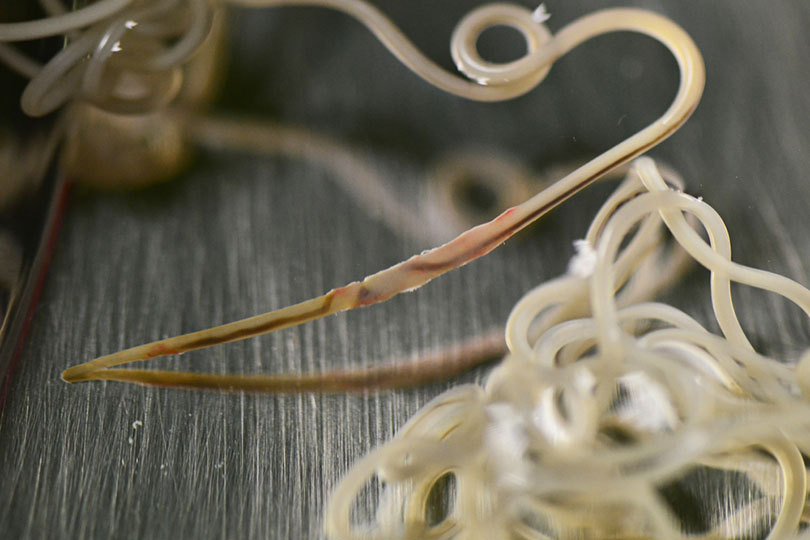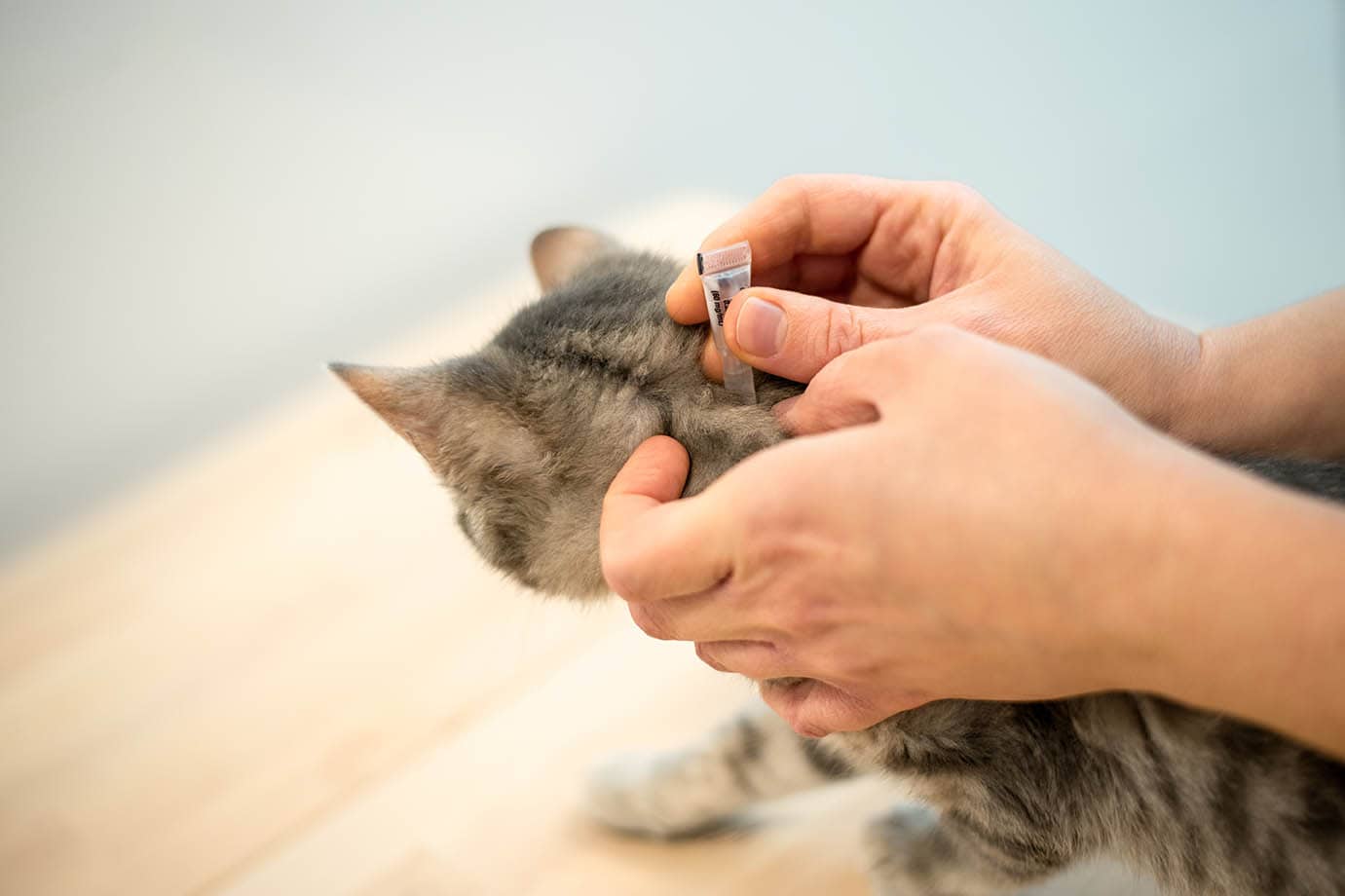
You would think that a cat that stays indoors all the time wouldn’t be prone to the diseases and conditions outdoor cats are. However, it’s been proven that indoor cats can get everything from rabies to ticks and from fleas to worms.
So, yes, indoor cats can get worms, just as your outside cats can. While it’s unlikely that your cat will pick up diseases and worms if he’s strictly an indoor cat, it is possible. For our purposes, we’ll just concentrate on how indoor cats can get worms, the kind of worms they can get, and how to prevent it from happening to your adorable feline in the future.
Which Worms Can Attack Your Indoor Cat?
There are five types of worms that could affect your indoor cat if you don’t prevent it from happening. We’ll discuss a little about all three below.
1. Tapeworms

A tapeworm is a flat, long worm that’s segmented and lives inside the small intestines of animals that are infected. The most common way for an indoor cat to become infected with tapeworms is by eating a flea that’s infected.
Even if your pet has never set foot on the ground outside, you can bring fleas into your home on your clothes, then they get on your cat. Another way an indoor cat can become infected with tapeworms is by eating infected rodents that could have made their way into your home.
2. Roundworms

Roundworms are another form of parasite that your indoor cat can get. Food and water sources can be infected with roundworm eggs. If your cat eats the parasite egg then he’ll become infected.
A kitten can get roundworms from its mother’s milk as well, which means a kitten you bring home could already have them. Roundworms can be transmitted through infected rodents as well, just as tapeworms can.
3. Heartworms

Many cat owners who keep their feline pals indoors don’t think they need to worry about heartworms, but it’s possible for your pal to become infected with this dangerous parasite also. Heartworms are a type of roundworm that is transmitted by the sting of an infected mosquito.
While it’s less likely your indoor cat with contract heartworms, mosquitos do get inside homes. So, if an infected mosquito gets into your home and bites your cat, he may contract heartworms as well.
So, it’s just as essential to protect your indoor cat against this dreaded parasite as it is the outdoor cats you own. Especially if you live in areas with a high prevalence of heartworm disease.
4. Hookworms

Hookworms are another type of parasite that can infect your indoor cat. These blood-sucking worms live in the intestines of your furry companion and can make them extremely sick. This parasite is brought in by rodents or lizards that make their way indoors. If your cat eats those pests, then he can end up with hookworms. Food and water sources contaminated with hookworm eggs are another common way an indoor cat can get infested by these parasites.
5. Lungworms
Lungworms, while more prevalent in outdoor cats who hunt outside and kill birds and rodents, have been known to attack indoor cats. This parasitic worm species attacks the cat’s lungs and respiratory system. Lizards, rodents, and even slugs or snails can bring these parasites into your home.
Now that we’ve discussed the types of worms that are most likely to be contracted by your indoor cat, we’ll go into a few of the symptoms of worms in your indoor cat in the next section.
Symptoms to Watch for in Your Indoor Cat
Sadly, the symptoms you should watch for in your indoor cat are generic and non-specific. It’s highly possible that your adult indoor cat will show no clinical symptoms of worms at all. However, we’ll list a few of the symptoms to be on the lookout for below.
While these symptoms are something to watch for in your indoor cat, it’s possible they might not present themselves and all. If you suspect your cat has worms, it’s best to consult your vet for the proper diagnosis and treatment.

How to Treat Worms in Your Cat
There are quite a few remedies out there to de-worm your cat. There are safe and effective treatments available from your vet as soon as he knows which parasitic worm he’s dealing with. It is best to avoid over-the-counter treatments without a vet’s prescription to avoid contributing to antiparasitic drugs resistance and complicating cases. It’s always best to contact your local vet for appropriate diagnosis and effective treatment options.
How to Prevent Worms in Indoor Cats

Of course, as with anything else in the world, prevention is key. Preventing the worms from getting to your indoor cat, to begin with, is the best way to protect them from these parasitic worms.
It’s essential to note that pet insurance doesn’t usually cover any type of parasitic treatment, so prevention is more important than ever for your cats.
Ways to prevent worms in your indoor cats include following good sanitation measures, such as cleaning the litter box daily, washing the litter box weekly, and avoiding overcrowding the litter box with more than two cats.
Make sure to keep your cat free of ticks and fleas, inspect your home regularly for any type of rodents, and avoid putting your cat on a raw meat diet, as worms can be caused by this type of diet as well.
Pretty much, taking care of your cat properly, coupled with regular trips to the vet for checkups, can save your cat and you a ton of heartbreak in the end.
A Word of Warning
While most cat owners realize the dangers of parasitic worms to their feline companions, many don’t realize that these same worms can be dangerous to human beings as well. There are sicknesses that can be transferred from animals to humans, and worms are one of them.
Make sure that you keep your children away from your cat’s litter box, and always wash your hands after scooping or cleaning the litter box itself to avoid this.
Washing your hands after petting your cat is essential, especially if you know the cat is already dealing with a worm infestation.
Final Thoughts
So, the answer to the question of whether indoor cats can get worms has been answered with a resounding yes. However, we know that there are different ways for this to happen and different types of worms they can be infected with.
The best thing to do is try to prevent the worms from getting to your feline pal, to begin with, and then dealing with the parasitic infection quickly if they do.
You may also want to read:
- 7 Best Cat Dewormers– Reviews & Top Picks
- My Cat Has Worms – How Do I Clean My House?
- Is It Wrong to Keep My Cat Indoors All the Time? (Vet Answer)
Featured Image Credit: xixicatphotos, Shutterstock








